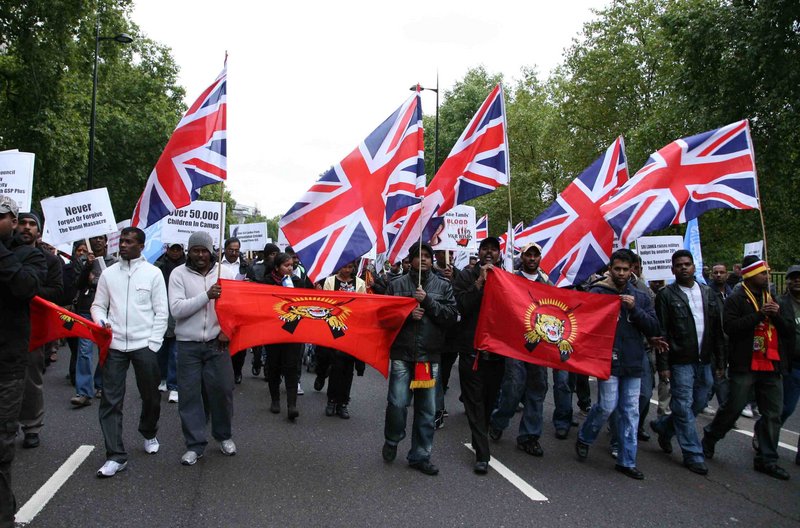
British Tamils with Union Jack and Tamil Eelam flags in London, 2009.
As a new British Prime minster takes office, Tamils across the country will be watching closely. It is indeed historic that Rishi Sunak will be the first person of South Asian office to hold the highest office in the country. However, both domestically and internationally, he will have his work cut out for him.
In the UK, hundreds of thousands of British Tamils will be keenly waiting to see how Sunak chooses to govern. His ascent to Number 10, comes as a cost-of-living crisis continues to rumble and financial uncertainty brews. Like millions of other Brits across the country, Tamils have also been impacted. From those running high street businesses to owners multi-million pound corporations, to the hundreds of thousands of other British Tamils, many will be looking to Sunak to steady the economy and ease the growing financial burdens. The coming months will be crucial.
The tens of thousands of Tamils employed in the public sector will also expect direct action from the new prime minister. Years of cuts to public spending and a policy of austerity have deeply impacted on how many of these public services function. The National Health Service, which previous Prime Ministers have acknowledged the role of Tamils in and a former health secretary declared could not run without Tamils, has been amongst the worst hit. Millions are suffering as a result. Revitalisation of our health services and more support for the public sector will be key.
On immigration, as Tamils continue to flee Sri Lanka – burdened by decades of genocide and a mismanaged financial crisis – the UK must look to protect those seeking refuge, particularly from such hostile states. They deserve protection, not to be held in deplorable conditions with the threat of deportation as is the case of those in Diego Garcia. Eelam Tamils, like many other communities, have contributed immensely to British life and prosperity. They should be welcomed.
It will not just be on domestic issues that Tamils will expect Sunak to act on. Despite Tamils having a vast array of opinions and passionate debates on issues across the British political spectrum, there is a clear and focussed consensus on what the UK government's policy on Sri Lanka should be. In short, Britain must do more to protect Tamil lives and Tamil rights. Sunak told an audience just a few months ago, that he had reflected on the “hurt and pain” that many Tamils underwent during the Sri Lankan government’s massacres of 2009. “I am proud of the UK’s role, and the UK will continue to play a central role in bringing about justice and accountability,” he said and pledged his commitment to ensuring justice was served.
But that accountability process has stalled. And for years, later British Tamils have been demanding more concrete action. Sri Lankan war criminals, for instance, must not be allowed to enter the UK unimpeded and must face judicial action. Sanctions must be more than simply a topic of examination and must instead be enacted swiftly. The Sri Lankan state has clearly demonstrated it is both unable and unwilling to act on accountability, so Sunak must ensure that Britain does, including by enacting an international judicial accountability mechanism.
Britain cannot allow Sri Lanka to escape justice for mass atrocities. 13 years on from hundreds of thousands of British Tamils protesting on the streets of Westminster, the demand for principled and tangible action from the British state has only grown. On this, there is remarkable unanimity across the political spectrum.
Whilst it is undoubtedly a significant moment that a man from a shared South Asian heritage is now Britain’s head of state, Tamils have learnt from their own torturous history in Sri Lanka, that it will be actions - not words or token gestures - that define any politial leader’s tenure. For years, the British Tamil ballot has played a key role in the UK’s elections. Amidst the uncertainty of politics in Westminster and growing calls for a general election, they are one demographic Sunak cannot choose to ignore.
